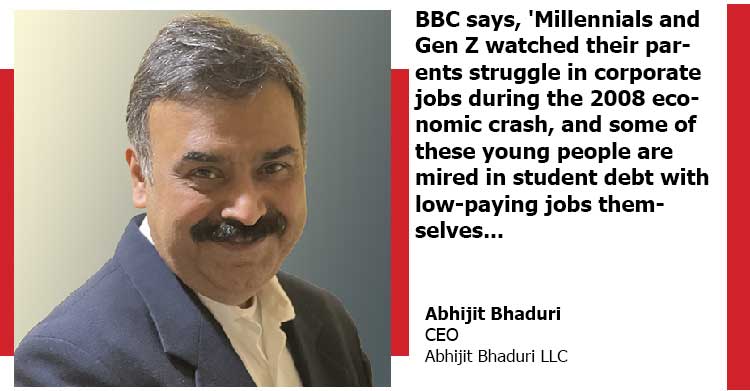How to Win Over Gen Z Talent: Convey Transparency and Upskilling in Your Talent Brand| CEO | Abhijit Bhaduri LLC

By 2025, they will make up one third of the global population. They evaluate employers on factors beyond salary and benefits. They have grown up with social media and want multiple points of view. Engagement matters hugely to them. Most of them have side hustles and view it as a way to learn new skills. It is time for employers to learn how to communicate with Gen Z.
Gen Z, the generation born between 1997 and 2012, is a formidable force. They are true digital natives, having grown up with social media as a fundamental part of their lives. This familiarity with online communication and collaboration is not just a convenience for them; it’s a way of life.
BBC says, ‘Millennials and Gen Z watched their parents struggle in corporate jobs during the 2008 economic crash, and some of these young people are mired in student debt with low-paying jobs themselves. They’ve also had their early work experiences shaped by Covid-19, with the youngest workers never even having stepped a foot inside an office. These stressors combined, says Brigham, have meant younger workers – particularly Gen Z – are prioritising mental health, happiness and positive work environments.’
Work is a contract and hence Gen Z is going to do what they are paid to. They choose employers based on factors beyond money and benefits. But the factor that they value is support of well being. They want more paid time off. They value mental health to a degree that older decision makers cannot relate to. Gen Z trusts social media and distrusts traditional authority figures. They rely on influencers who challenge experts. Take for instance financial advice.
In my conversation with business leaders I have found that they struggle to leverage the biggest influencers they already have – their employees. By leveraging the creators among the employees they can share authentic stories about the culture of the workplace. An employee talking about the work practices or investment in upskilling is more believable than the employer putting out cliches like, “Employees are our biggest assets”.
What are the actions employers can take
Building a Strong Talent Brand: A talent brand is the reputation and perception of an organization as an employer. It’s not just about offering competitive salaries and benefits anymore. Gen Z is looking for a deeper connection. Learn to communicate this on social media. Gen Zers expect relatable, ultra-personalized, easily digestible, and engaging content from people who look and sound like them. They prioritize how and who presents the content, often at the expense of quality and accuracy.
Leveraging Employee Advocacy: One of the most powerful tools in building a strong talent brand is leveraging your own employees as influencers. Employees are the most trusted source of information about a company. Encouraging them to share their stories and experiences on social media can help organizations reach and engage with Gen Z candidates. When leaders also actively participate in social media, they can showcase their thought leadership and vision, building trust and credibility with potential and current employees.
Conclusion: Gen Z is not just another generation entering the workforce; they are a force driving change. To compete for talent in this digital age, organizations must build a strong talent brand that reflects their values and purpose. By leveraging their employees and leaders as influencers, organizations can connect with Gen Z candidates who are seeking authentic and meaningful work experiences.


